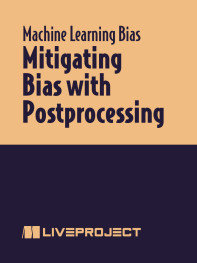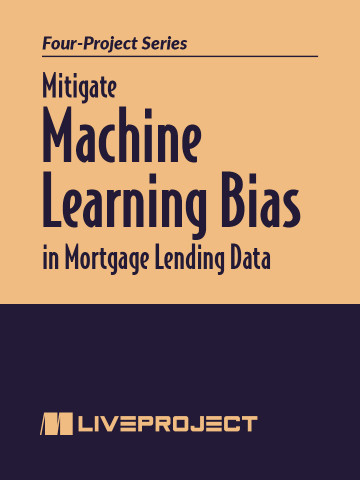- prerequisites
- beginner Python, Jupyter Notebook, and pandas • basic scikit-learn • basics of machine learning
- skills learned
- charting and visualizing metrics • computing bias performance metrics on a logistic regression classifier • preprocessing with the “reweighing subjects” method • post-processing with the “equalized odds” method
pro $24.99 per month
- access to all Manning books, MEAPs, liveVideos, liveProjects, and audiobooks!
- choose one free eBook per month to keep
- exclusive 50% discount on all purchases
lite $19.99 per month
- access to all Manning books, including MEAPs!
team
5, 10 or 20 seats+ for your team - learn more

In this series of liveProjects, you’ll apply techniques for measuring and mitigating bias in a machine learning algorithm. You’ll step into the role of a data scientist for a bank, and investigate the potential biases that arise when automated decision-making is applied to your company’s mortgage offers—in particular, whether your algorithm is biased by gender. Each project in this series covers a different aspect of fairness measurement and intervention, including exploring a dataset with a focus on fairness, and mitigating bias in a logistic regression model.
here's what's included





team
- five seats for your team
- access to all Manning books, MEAPs, liveVideos, liveProjects, and audiobooks!
- choose another free product every time you renew
- choose twelve free products per year
- exclusive 50% discount on all purchases
-
![]() Mitigate Machine Learning Bias in Mortgage Lending Data project for free
Mitigate Machine Learning Bias in Mortgage Lending Data project for free
Prerequisites
The liveProject is for beginner data scientists and software engineers looking to tackle the basic principles of measuring and mitigating ML bias. To begin this liveProject, you will need to be familiar with the following:
TOOLS
- Basic Python
- Basic Jupyter Notebook
- Basic pandas
- Basic scikit-learn
- Basic seaborn
- Basic machine learning
 features
features
- Self-paced
- You choose the schedule and decide how much time to invest as you build your project.
- Project roadmap
- Each project is divided into several achievable steps.
- Get Help
- While within the liveProject platform, get help from fellow participants and even more help with paid sessions with our expert mentors.
- Compare with others
- For each step, compare your deliverable to the solutions by the author and other participants.
- book resources
- Get full access to select books for 90 days. Permanent access to excerpts from Manning products are also included, as well as references to other resources.


 Mitigate Machine Learning Bias in Mortgage Lending Data project for free
Mitigate Machine Learning Bias in Mortgage Lending Data project for free